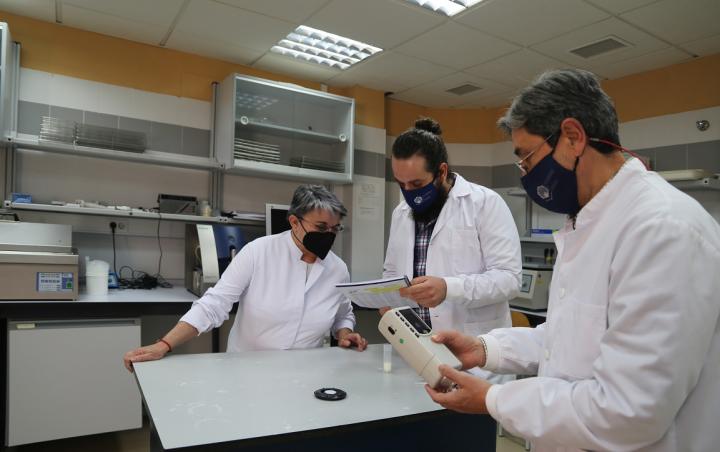
Credit: University of Córdoba
The global production of sheep’s milk is one the rise, in the vast majority of cases used to produce cheese. However, a relatively large amount of milk is needed to produce it, so science is looking for ways to increase its yield; that is, to obtain more cheese using less milk.
Immersed in this task, a team from the Department of Animal Production at the University of Cordoba, led by Professor Ana Garzón, has collaborated with the University of Leon in the search for genetic parameters affecting the cheese production of milk from Churra sheep, one of the oldest and most rustic breeds on the Iberian Peninsula.
After analysing traits related to rennet and milk properties (pH, milk yield, fat and protein content) in a sample of more than 1,000 sheep, the research team found a low to moderate heritability of these traits, suggesting that their improvement can be achieved through genetic selection. In addition, the need to consider milk pH at the beginning of the coagulation process as a characteristic to be taken into accountas a selection index for the improvement of Churra quality was confirmed, as it will augment the ‘cheesemaking capacity’ of the milk from this breed.
The team,formed by Ana Garzón andthe researchers Antonio Figueroa and Javier Caballero-Villalobos, comprise the Dairy Laboratory, where the milk samples of this work were analysed, measuring their pH; the physical-chemical parameters of the milk, such as its proteins, fats, and lactose; and technological parameters, such as coagulation time and curd hardening speed; with the aim of providing information for the selection of values to be included in the genetic selection scheme of the Churra breed in order to obtain ewes that give milk with a higher yield in terms of cheese production.
The UCO Dairy Laboratory | The science that cares for milk
This service, part of the UCO’s Department of Animal Production, has been working since 2003 on the study of the composition, quality and technological parameters of ruminant milk with the aim of transferring knowledge to the livestock sector to improve milk quality, productivity and yields.
The Dairy Laboratory specialises in the study of the Manchega breed, which is the most important class of sheep in terms of product quality and economic weight in the sector. In this regard, the search for a faster, cheaper and more efficient method to measure the quality of milk according to its composition is one of their main lines of research, as they are trying to determine whether chromaticity can provide information sufficient for the livestock sector to evaluate milk quickly and cheaply.
They are also striving to solve the problem of water retention in curd, which reduces the milk’syield, thus requiring a lot of milk to obtain cheese. In their latest work, they develop mathematical models to achieve more efficient milk for cheese production. Finally, they analyse the correlation between the health of the sheep’s udder and these coagulation parameters of the milk slated for cheese production.
In short, this work directly transfers the science carried out in the Laboratory to the livestock sector, which benefits from improvements in the quality and efficiency of its dairy farms.
###
Media Contact
Elena Lázaro
[email protected]
Related Journal Article
http://dx.




